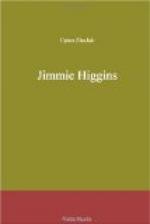And then Schneider leaped up. Yes, and it was that money which had provided the cannon and shells that were now being used in laying waste East Prussia, the land of Schneider’s birth!
II
The temper of both sides was rising higher and higher, and the neutrals made efforts to calm the dispute. Comrade Stankewitz, Jimmie’s cigar-store friend, cried out in his shrill eager voice: Vy did we vant to git mixed up vit them European fights? Didn’t we know vat bankers and capitalists vere? Vat difference did it make to any vorking man vether he vas robbed from Paris or Berlin? “Sure, I know,” said Stankewitz, “I vorked in both them cities, and I vas every bit so hungry under Rothschild as I vas under the Kaiser.”
Then Comrade Gerrity, organizer of the local, took his turn. Whatever they did, said Gerrity, they must keep their neutrality in this war; the one hope of the world just now was in the Socialist movement—that it would preserve the international spirit, and point a war-torn world back to peace. Especially just now in Local Leesville they must keep their heads, for they were beginning the most important move in their history, the establishment of a weekly paper. Nothing must get in the way of that!
Yes, said Comrade Service, but they would have to determine the policy of the paper, would they not? Were they going to protest against injustice at home, and pay no attention to the most flagrant act of international injustice in the history of the world? Was a working man’s paper to say nothing against the enslavement of the working men of Europe by the Kaiser and his militarist crew? He, Dr. Service, would wash his hands of such a paper.
And then the members of the local gazed at one another in dismay. Every man and woman of them knew that the prosperous doctor had headed the list of subscribers for the soon-to-be-born Leesville Worker with the sum of five hundred dollars. The thought of losing this munificent contribution brought consternation even to the Germans!
But there was one member of the local whom no menace ever daunted. He rose up now—lean, sallow almost to greenness, with black hair falling into his eyes, and a cough that racked him at every other sentence. Bill Murray was his name; “Wild Bill”, the papers called him. The red card he carried had been initialled by the secretaires of some thirty locals all over the country. He had lost a couple of toes under a tractor-plough in Kansas, and half a hand in a tin-plate mill in Alleghany County; he had been clubbed insensible in a strike in Chicago, and tarred and feathered in a free speech fight in San Diego. And now he told the members of Local Leesville what he thought of those tea-party revolutionists who pandered to the respectability of a church-ridden community. “Wild Bill” had watched the discussions over “Section Six”, the provision in the constitution of the party against




